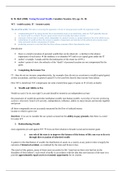R. M. Bird (1980). Taxing Personal Wealth. Canadian Taxation, 2(1), pp. 35- 38.
WT – wealth tax(es); IT – income tax(es)
The aim of the article: Bird aims at reviewing the arguments in favour of taxing personal wealth; the arguments include:
1. complementing the IT by taxing 'income' that is not normally taxed, or not taxed fairly, under an IT (IT generally does not
tax income until it is realized; IT taxes capital income more favourably than labour income);
2. extension of the tax base to wealth, which, independent of a person's income, is a proper measure of his or her ability to pay;
3. redistribution of wealth and thus the increase in equality of opportunity and reduction of the political and economic power
often associated with the concentration of wealth;
4. producting revenue in a way that likely has fewer adverse economic effects than alternative taxes
Introduction
there is a trend in taxation of personal wealth that can be observed – a decline in the relative
importance of such taxes the tendency is to abandon WT and to tax capital gains under the IT
author’s example: Canada and the discontinuation of the estate tax (1971)
author’s point of view: the setbacks of the “death” of personal taxation are not compensated by the
gains
1. Completing the Income Tax
IT – they do not tax income comprehensively; for example: they do not tax accretions to wealth (capital gains)
as they accumulate, and thus in general capital IT to be taxed less heavily than income from labour.
How WT is beneficial: WT compensates (to some extent) these gaps or lapses in IT (if only at death)
2. Wealth and Ability to Pay
Wealth as such (“in its own right”) can and should be treated as an independent tax base
the possession of wealth (in particular nonhuman wealth; non-human wealth: ownership of income producing
assets) is inherently linked with security, independence, influence, ability to enjoy leisure and income together
and power
all these compounds are not accurately measured by the flow of realized money
income to which it gives rise
therefore: if we are to consider the tax system as based on the ability-to-pay grounds, then there is a need
for some WT
3. Redistributing Wealth
most arguments pro and against WT focus on their relation to broader social and economic goals
i. one role of the state is to improve the fairness of the lottery of life: one way to do so is
through direct taxation of inherited wealth
A pattern in the distribution of wealth: the distribution of assets in a country at any point in time is largely the
outcome of historical accident, as condoned by the state and frozen in law.
The result of this pattern: many of those most successful in life “stand not on their own feet but on the
shoulders of their fathers”; such result is hardly in accordance with the idea that one function of the state is to
provide approximately equal access to economic opportunity for its citizens
WT – wealth tax(es); IT – income tax(es)
The aim of the article: Bird aims at reviewing the arguments in favour of taxing personal wealth; the arguments include:
1. complementing the IT by taxing 'income' that is not normally taxed, or not taxed fairly, under an IT (IT generally does not
tax income until it is realized; IT taxes capital income more favourably than labour income);
2. extension of the tax base to wealth, which, independent of a person's income, is a proper measure of his or her ability to pay;
3. redistribution of wealth and thus the increase in equality of opportunity and reduction of the political and economic power
often associated with the concentration of wealth;
4. producting revenue in a way that likely has fewer adverse economic effects than alternative taxes
Introduction
there is a trend in taxation of personal wealth that can be observed – a decline in the relative
importance of such taxes the tendency is to abandon WT and to tax capital gains under the IT
author’s example: Canada and the discontinuation of the estate tax (1971)
author’s point of view: the setbacks of the “death” of personal taxation are not compensated by the
gains
1. Completing the Income Tax
IT – they do not tax income comprehensively; for example: they do not tax accretions to wealth (capital gains)
as they accumulate, and thus in general capital IT to be taxed less heavily than income from labour.
How WT is beneficial: WT compensates (to some extent) these gaps or lapses in IT (if only at death)
2. Wealth and Ability to Pay
Wealth as such (“in its own right”) can and should be treated as an independent tax base
the possession of wealth (in particular nonhuman wealth; non-human wealth: ownership of income producing
assets) is inherently linked with security, independence, influence, ability to enjoy leisure and income together
and power
all these compounds are not accurately measured by the flow of realized money
income to which it gives rise
therefore: if we are to consider the tax system as based on the ability-to-pay grounds, then there is a need
for some WT
3. Redistributing Wealth
most arguments pro and against WT focus on their relation to broader social and economic goals
i. one role of the state is to improve the fairness of the lottery of life: one way to do so is
through direct taxation of inherited wealth
A pattern in the distribution of wealth: the distribution of assets in a country at any point in time is largely the
outcome of historical accident, as condoned by the state and frozen in law.
The result of this pattern: many of those most successful in life “stand not on their own feet but on the
shoulders of their fathers”; such result is hardly in accordance with the idea that one function of the state is to
provide approximately equal access to economic opportunity for its citizens


